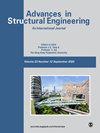Enhancing the interfacial bond performance of engineered cementitious composites and concrete
IF 2.6
4区 工程技术
Q2 CONSTRUCTION & BUILDING TECHNOLOGY
引用次数: 0
Abstract
This study aims to investigate the influence of different surface treatments, including smooth interface, rough interface, anchor bolt connection, and epoxy bonding agent, on the shear resistance of Engineered Cementitious Composites (ECC)-concrete interface through bi-surface shear testing. The experimental results show that the interfacial shear strength between ECC and concrete is significantly enhanced by the implementation of the three interface treatment methods, as opposed to the smooth interface. Among these methods, the anchor bolt connection exhibits the greatest improvement in interfacial bonding performance. Notably, cohesive failure is observed in the anchor bolt connection method, while the other three methods result in adhesive failure, with only the anchor bolt connection method displaying ductile failure behavior. Following a comprehensive review of relevant studies and the outcomes of this experiment, three distinct interface bonding mechanisms were identified and the forces contributing to the bond were analyzed. Results indicated that the interfacial bond strength is notably influenced by the surface roughness. These research findings substantiate the viability of utilizing the anchor bolt connection method, particularly in applications where ductility requirements in the repair layer are essential for structural integrity.提高工程水泥基复合材料和混凝土的界面粘结性能
本研究旨在通过双表面剪切试验,研究不同表面处理方法(包括光滑界面、粗糙界面、锚栓连接和环氧粘接剂)对工程水泥基复合材料(ECC)-混凝土界面抗剪性能的影响。实验结果表明,与光滑界面相比,三种界面处理方法都能显著提高 ECC 与混凝土之间的界面抗剪强度。在这些方法中,锚栓连接对界面粘结性能的改善最大。值得注意的是,在锚栓连接方法中观察到了内聚破坏,而其他三种方法则导致粘合破坏,只有锚栓连接方法显示出延展破坏行为。在对相关研究和本实验结果进行全面回顾后,确定了三种不同的界面粘合机制,并对造成粘合的力进行了分析。结果表明,界面粘接强度明显受到表面粗糙度的影响。这些研究结果证明了使用锚栓连接方法的可行性,尤其是在对结构完整性有重要要求的修复层中。
本文章由计算机程序翻译,如有差异,请以英文原文为准。
求助全文
约1分钟内获得全文
求助全文
来源期刊

Advances in Structural Engineering
工程技术-工程:土木
CiteScore
5.00
自引率
11.50%
发文量
230
审稿时长
2.3 months
期刊介绍:
Advances in Structural Engineering was established in 1997 and has become one of the major peer-reviewed journals in the field of structural engineering. To better fulfil the mission of the journal, we have recently decided to launch two new features for the journal: (a) invited review papers providing an in-depth exposition of a topic of significant current interest; (b) short papers reporting truly new technologies in structural engineering.
 求助内容:
求助内容: 应助结果提醒方式:
应助结果提醒方式:


